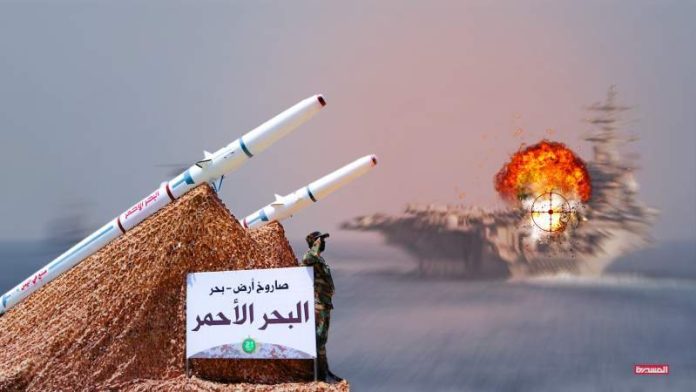Lebanese writer and journalist Abdulhussain Shbib considers that the naval confrontation between Yemen and the United States has put American influence in the Middle East to the test, likely resulting in catastrophic results for Washington.
He indicated that the effectiveness of the American military presence in the region is the second pillar supporting Washington in imposing its influence, dominance, and control over many Middle Eastern regimes, distributed across bases, aircraft carriers, and long-range missile systems.
Shbib stated that the naval confrontation has subjected this military presence to a new test of strength, with several countries refraining from approving Washington’s use of these bases to strike Yemenis, fearing their reactions against the countries where these bases are stationed.
He pointed out that the second setback was the exposure of American and British naval power, along with a few other countries, to Yemeni weaponry. It became evident that reducing the effectiveness of these advanced warships and destroyers is not a challenging task.
“Washington has also become incapable of protecting its civilian and military naval vessels,” Shbib said. Summarizing the unequal confrontation with Yemen, he questioned how the US would restore its reputation and influence, and who it would now intimidate.
Journalist Shbib considered that the reluctance of many countries in the region and the world to join the “Prosperity Alliance” highlighted Washington’s inability to impose its decisions on countries that usually do not comply with its requests.
He emphasized that the countries relying on American protection for their stability will no longer be able to count on that protection after Washington fails to provide security not only for “Israel” but even for its military bases.
He also affirmed that the American military power has lost a significant portion of its capacity to invest in this field, which has been a cornerstone of American external dominance for decades.
Journalist Shbib emphasized that the alignment of the resistance axis into practical coordination in the region, in support of Gaza, constitutes a direct rejection of all direct and indirect American threats that have been issued against those who support Palestinian resistance.
He affirmed that the parties in this region have become governing partners in the region’s security and cannot be ignored or imposed conditions upon. Even the curse of the “terrorist” classification will rebound on Washington.
Yemenis have openly declared their support for Palestine’s struggle against Zionist occupation since the regime launched a devastating war on Gaza on October 7, following the surprise Operation Al-Aqsa Storm by Palestinian resistance movements.
Yemeni Armed Forces have targeted ships in the Red Sea with owners linked to Israel or those going to and from ports in the occupied territories.
In response, the US has formed a military coalition against Yemeni forces in the Red Sea and endangered maritime navigation in the strategic waterway.
The Yemeni Armed Forces have declared that they will not cease retaliatory strikes. The maritime attacks have compelled major shipping and oil companies to suspend their voyages to the ports of the Zionist enemy.
Source: Al-Masirah Net


















